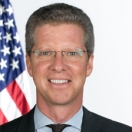
We've made big strides in the fight against Malaria - saving millions of lives. That's American leadership at work. pic.twitter.com/jVdeE4Qktw
— President Obama (@POTUS) February 22, 2016
If you’ve ever swatted away a mosquito on a muggy summer night, then you know how annoying these winged pests can be. But in many parts of the world, mosquitos are not just irritating—they’re deadly. Malaria, which is transmitted by mosquitos, took the lives of 438,000 people worldwide last year. More than 3 billion people remain at risk of contracting this horrific disease, which is especially dangerous for pregnant mothers and young people. As President Obama put it last September, “Many children are just one mosquito bite away from death. And that is a moral outrage.”
That’s why the President’s recently-submitted budget requests an additional $200 million for the President’s Malaria Initiative—a bipartisan effort begun by President George W. Bush to reduce the burden of malaria in Africa and Southeast Asia. Under the PMI, the United States government—including USAID, the CDC, the Department of Defense, and the Peace Corps—has worked with partner countries, donors, and multilateral organizations across the globe to make real progress against malaria.
This brings the total funding the White House has requested for this initiative to $874 million next fiscal year—a 30 percent increase from this year, and more than doubling PMI’s budget at the beginning of the Administration. And, with these additional resources, we will be able to take bold new steps to combat this ancient nemesis.
- First, we’re adding PMI programs in three new countries—Sierra Leone, Cote D’Ivoire, and Cameroon—and expanding our existing program in Burkina Faso nationwide. That means nearly 70 million more at-risk people will have access to insecticide-treated nets, anti-malarial drugs, and other interventions. Our work will now cover roughly 332 million people—92 percent of those at risk—from Senegal to Cameroon.
- Second, the United States—in partnership with host governments, NGOs, and other partners—is launching an effort to eliminate malaria in two countries: Zambia and Cambodia. Zambia suffered from high rates of malaria, so if we can eliminate malaria there, we can eliminate it anywhere. And, because Cambodia is the geographic epicenter of emerging malaria strains that are becoming resistant to anti-malarial drugs, ridding Cambodia of malaria would reduce the threat of drug-resistant malaria elsewhere.
- Third, we’re going to provide nearly 14 million bed nets and ensure that over 27 million people in sub-Saharan Africa can sleep safely at night. Because simply sleeping under a low-cost, insecticide-treated bed net is the most effective malaria intervention we have. In fact, the World Health Organization estimates that nearly 70 percent of the malaria cases averted in the past decade and a half were thanks to bed nets.
- Finally, working with both public and private sector researchers, we’re going to accelerate the research, development, and evaluation of new tools to combat malaria. We want to spur the development of a range of technologies, from better diagnostic equipment to greater control over malaria-ridden mosquitos to critical vaccines and medicines. Our goal is to help spark the next big discovery—because it could save lives.
From our ongoing efforts to combat the Zika virus (which is also transmitted by mosquitos), to joining our African partners in defeating Ebola, to fighting HIV/AIDS, promoting global health and global health security has been a cornerstone of President Obama’s foreign policy. And—in partnership with other governments, donors, multilateral organizations, and the broader public health community—we’ve come closer than ever to banishing the scourge of malaria from the planet. Since 2000, we’ve halved the number of children killed by malaria and saved more than 6 million lives. Over 100 countries are now malaria-free, with another 57 cutting their incidence of malaria by at least three quarters. More kids can go to school. More parents can go to work. More people can say, as one Malian mother did, “I came to the community health worker because my son had a fever, and I’m thankful we were able to get medicine.”
But we can’t take our eye off the ball. In just the past minute, more than 400 people contracted malaria. Many of these are children—beautiful young people who will never become the next Nelson Mandela or Graça Machel. As our USAID Administrator, Gayle Smith, has said, “The battle against malaria is also a battle against complacency."
We’ve beaten malaria before—stamping it out across the United States and the Western world—and we can do it again. Today’s announcement is a big step towards defeating a small but deadly foe. We hope you’ll join us in this fight. Working together, we can help make malaria history.


